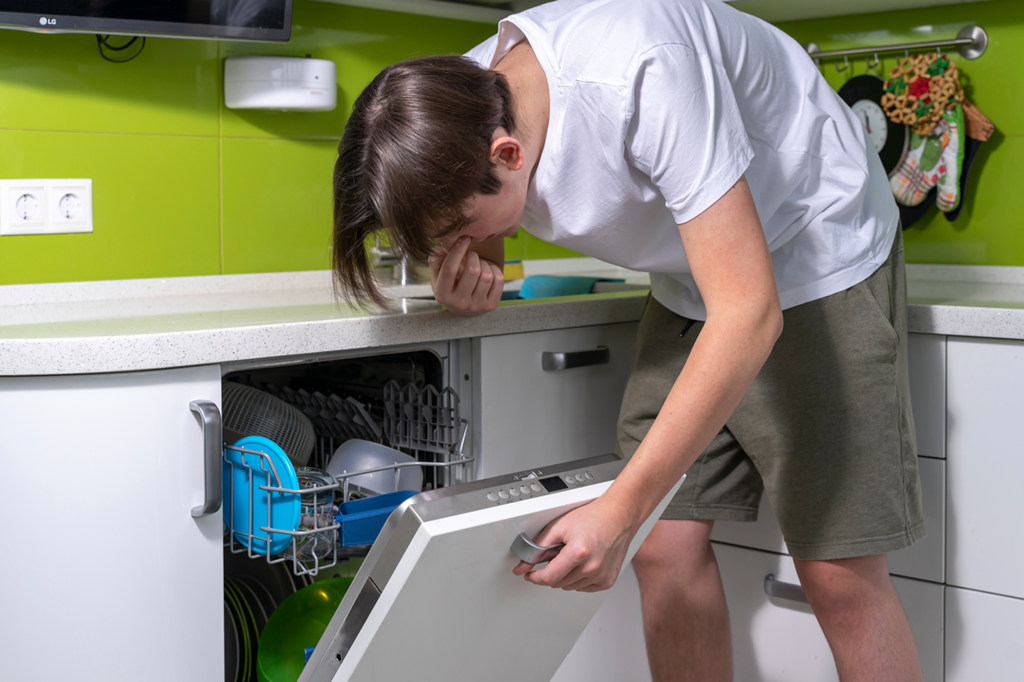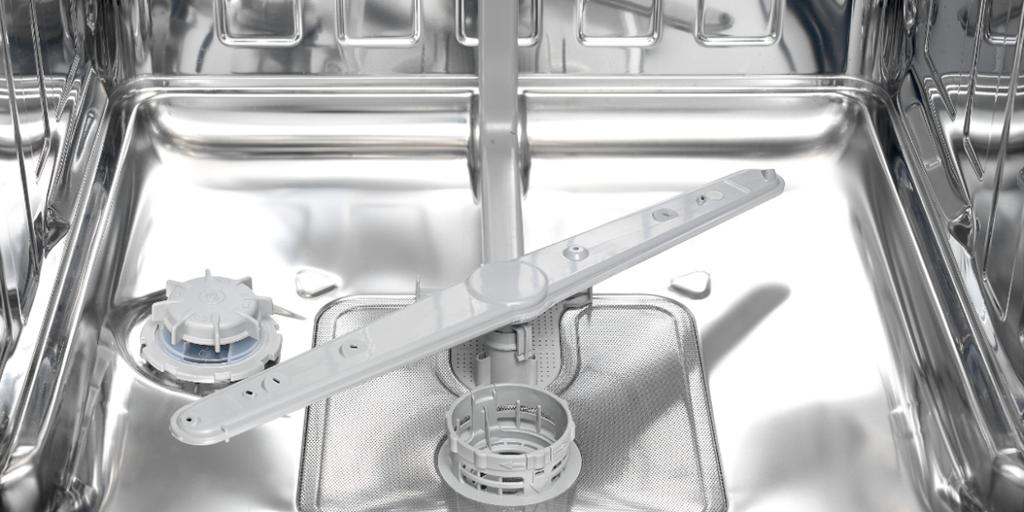It’s the end of a long day, and the last thing you want to deal with is your stinky Dishwasher. As you open it to load the dirty dishes from dinner, a sudden wave of rotten egg smell hits you hard. Blurgh! It is not exactly an appetizing odor coming from your Dishwasher.
Many dishwasher owners deal with this sulfurous stench. The culprit? A buildup of food particles, grease, hard water minerals, mold, mildew, and bacteria inside your Dishwasher likely causes it. While the odor is unpleasant, the more significant concern is that the gunk causing the smell can also lead to poor cleaning performance.
Don’t worry – with some troubleshooting and cleaning, you can banish that rotten egg odor from your Dishwasher for good. In this article, I’ll review the leading causes of a smelly dishwasher and give tips to diagnose the issue. You’ll also learn why does my dishwasher smell like rotten eggs. Let’s get started!
What Causes Dishwasher Smell Like Rotten Eggs?
A few common culprits can contribute to your Dishwasher emitting a sulfur-like rotten egg odor:
1. Food Particles and Grease Buildup
Leftover food debris and greasy gunk stuck on dishwasher parts are some of the most common sources of lousy Dishwasher smells. Food scraps can get trapped in the filter, along the door gasket, and in nooks and crannies throughout the machine. As food particles rot and decay, it causes foul odors. Grease buildup also goes rancid and can smell pretty funky.
2. Mold and Mildew Growth
Your Dishwasher’s warm, moist environment is the perfect breeding ground for mold, mildew, and bacteria. These microscopic organisms feed on food particles and soap scum and release stinky sulfur compounds as they grow. Black mold and orange mildew stains may start to appear, too.
3. Hard Water Mineral Buildup
Hard water contains high amounts of calcium, magnesium, and other dissolved mineral salts. Over time, these minerals can form white or yellowish deposits inside your Dishwasher. Hard water mineral buildup leads to clogged parts and poor cleaning and interacts with food soil to make nasty odors.
4. Clogged or Faulty Air Gap
An air gap protects your Dishwasher from the backflow of dirty sink water. But when clogged, it can cause water to back up and stagnate. Stagnant water breeds odor-causing bacteria and becomes a source of unpleasant rotten egg smells. A faulty air gap that’s leaking needs to be replaced.
5. Old or Incorrectly Used Dishwasher Detergent
Dishwasher detergents contain additives that help break down food soils. But if your detergent is old or you’re using too little, food particles won’t get broken down effectively. Incorrect detergent use can contribute to the buildup of smelly gunk.
6. Drainage Issues
Slow draining or water pooling in the bottom of your Dishwasher allows organic matter to accumulate. This stagnant water and debris creates the perfect environment for odor-causing bacteria and mold growth. Make sure your drain hose and pump aren’t clogged.
7. Door Gaskets, Jets, and Filters Need Cleaning
Gunk trapped in dishwasher parts like the door gasket, jets, and filters eventually smells. These components need regular cleaning to avoid the accumulation of food particles that can decay and cause rotten egg odors.
8. Electronic Control Board Failure
On some dishwashers, a malfunctioning electronic control board can erroneously trigger the release of an egg-like odor at the end of the wash cycle, even when no food soils are present. This rare issue requires control board replacement.
Now that you know what typically causes dishwasher smell like rotten eggs, let’s review some troubleshooting tips to pinpoint the problem.
How to Diagnose What’s Causing the Rotten Egg Smell
Start your investigation by noting when the smell occurs – does the odor only happen when the door is opened at the end of the cycle? Or is there a constant egg stench coming from the Dishwasher throughout?
Here are some troubleshooting steps to identify the issue:
- Inspect Inside the Tub – Take out dishwasher racks and carefully look inside the tub for any visible food debris, grease, mildew stains, or mineral buildup. Use a flashlight to illuminate all corners.
- Check Door Gaskets – Wipe along the door seals and look for trapped food particles or mold growth. Run your fingers along the folds.
- Remove and Check Filters – Your Dishwasher has a coarse and fine filter. Remove and inspect under running water for clogs.
- Clean and Inspect Jets and Arms – Detach the spinning arms inside the tub and use a toothbrush to loosen debris clogging the jets.
- Check Drain Hose – Disconnect from garbage disposal or drain pipe and look for blockages. Make sure it isn’t kinked or coiled too tightly.
- Test Air Gap – Pour water into your sink with the Dishwasher running to check if dirty water backs up into the air gap unit.
- Assess Detergent Use – Ensure you use the recommended dishwasher detergent amounts and that the detergent is fresh, not years old.
- Eliminate Odor Source: Remove any lingering rotten food stuck in the tub and run a vinegar rinse cycle to clean out odors before they get trapped.
- Drain Pump Issue – If you have standing water, your drain pump may be jammed and need repair.
You should be able to pinpoint what’s causing the offensive rotten egg odor in your Dishwasher through methodical troubleshooting. Now, let’s get into cleaning solutions!
How to Clean a Smelly Dishwasher Smell Like Rotten Eggs
Once you’ve identified the problem, thoroughly cleaning your dishwasher is critical to eliminate odors permanently.
Follow these steps:
1. Remove Dishwasher Parts
Start by removing all your Dishwasher’s removable dishwasher racks, utensil caddy, filters, jets, and arms. This allows full access to the tub and parts for cleaning.
2. Clean Dishwasher Filters
Check your manual to see if your disDishwashers a coarse, fine, or both filters. Soak, scrub, and rinse them thoroughly to remove all debris trapped deep.
3. Clean Door Gaskets
Take a clean toothbrush and gently scrub the folds and crevices around the door gasket to dislodge the gunk. Wipe off all residue with a towel.
4. Clean Jets and Arms
Use a toothpick or stiff brush to poke out food particles clogging the holes of the spinning arms. Flush with water.
5. Clean Interior Tub
Spray down the inside surfaces of the tub with a vinegar solution. Let soak for 15 mins, then scrub off mold, mildew, and stains with a non-scratch sponge.
6. Deodorize
The dishwasher sprinkles baking soda or dishwasher cleaner powder into the empty tub. Run the hottest cycle with vinegar in the detergent cup to sanitize and deodorize.
7. Clean Door Exterior
Wipe the outer door surface, handle, and control panel with warm, soapy water or an all-purpose cleaner. Avoid letting water seep into electrical parts.
8. Unclog Air Gap
Disconnect the air gap and use a pipe cleaner to clear any food debris or gunk. Reattach securely. Replace if faulty.
9. Clean the Drain Hose and Pump
Straighten the hose, remove blockages, and flush with hot water. Check pump impeller for obstructions.
10. Leave Door Open
After cleaning, open the dishwasher door to allow moisture to evaporate and prevent new mildew growth.
11. Use Rinse Aid
Rinse aid helps water sheet off dishes for spot-free results. It also prevents moisture from pooling to discourage smelly mold and mildew.
With a thorough, deep clean and these preventative steps, your dishwasher will be sparkling and odor-free. No more rotten egg stench when you go to load dishes!
Tips to Prevent Bad Dishwasher Smells
Here are some handy tips to stop your disDishwasherom ever smelling like rotten eggs again:
- Scrape off food debris, and don’t overload the disDishwashern rinse or quick cycle if dishes will sit for a while before full wash
- Frequently check and clean dishwasher filters
- Leave the door cracked open between loads
- Use dishwasher cleaning tablets monthly
- Always use fresh, proper amounts of detergent
The Takeaway
That putrid rotten egg odor coming from your disDishwashern be off-putting. But with proactive troubleshooting and cleaning, you can remove smells and have an odor-free dishwasher again.
The key steps are:
- Inspect and diagnose what’s causing the bad smell – food, mildew, clogs, etc.
- Do a thorough deep clean of all dishwasher components
- Deodorize with baking soda or vinegar
- Practice preventative maintenance in the future
Don’t tolerate a stinky dishwasher! With some elbow grease and these dishwasher smell like rotten eggs tips, you can feel confident loading up your dishes without being hit with an unpleasant odor again.
FAQs
Why Does My Dishwasher Smell Like Sewage?
A rotten egg/sewage smell could indicate food buildup in the drain hose or pump. Clogged parts can lead to stagnant water and unpleasant sewage-like odors.
Why Does My Dishwasher Smell Like Wet Dog?
This musty odor is typically caused by mold, mildew, or bacteria growing inside the moist dishwasher tub and parts. Prolonged cycles and poor drying contribute to this microbial growth.
Why Does My Dishwasher Smell Like Fish?
Dishwashers can absorb leftover fish odors from the washed dishes. Using a rinse aid and not overcrowding the dishwasher helps prevent fish smells from lingering.
Why Does My Dishwasher Smell Like Eggs?
The sulfur compounds in egg yolks can leave a stubborn rotten egg odor inside your disDishwasheraking sure to rinse egg residue thoroughly before loading dishes helps avoid this.
Why Does My Dishwasher Smell Like Burning Plastic?
Overheated plastic tubing, insulation, or dishwasher parts produce a distinctive burning plastic/chemical odor. This usually indicates an electrical or motor issue.
Why Does My Dishwasher Smell Like Burning?
A burning rubber smell indicates a slipping, worn, or jammed drive belt that runs the motor. Replacing a defective belt fixes this burnt odor.
Why Does My Dishwasher Smell Like Mildew?
The humid interior of dishwashers readily promotes mildew growth. A musty stench signifies mold buildup that requires thorough cleaning to eliminate.







